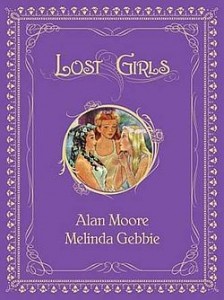 Lost Girls, the unabashedly pornographic update on characters from children’s literature classics as imagined by Melinda Gebbie and Alan Moore, is without a doubt one of the most provocative graphic novels published in recent memory. In recounting the sexual awakenings of Wendy, Dorothy, and Alice, the book features incest, bestiality, a three-way tryst between the heroines, and many more varieties of sex.
Lost Girls, the unabashedly pornographic update on characters from children’s literature classics as imagined by Melinda Gebbie and Alan Moore, is without a doubt one of the most provocative graphic novels published in recent memory. In recounting the sexual awakenings of Wendy, Dorothy, and Alice, the book features incest, bestiality, a three-way tryst between the heroines, and many more varieties of sex.
Unlike some of Moore’s other works, Lost Girls is rarely challenged or banned in U.S. libraries — because not many of them have it in the first place. (Of the approximately 150 that do, only a few are public libraries; the rest are at art institutes, universities, and the Kinsey Institute for Research in Sex, Gender and Reproduction.) Earlier this year, however, the public library system in Auckland, New Zealand, decided not to add the book to its collection for fear of prosecution under the country’s indecency law. And in 2010, importation of the book to the United Kingdom was temporarily halted as Customs officials considered whether it contravened a new law “criminalizing ownership of sexual images of people under 18.”
In a session at last month’s Edinburgh International Book Festival, Gebbie discussed her background in comics, her collaboration with Moore (now her husband), and her thoughts on censorship, which she’d experienced well before Lost Girls.
As one of the few women in the San Francisco’s underground comix scene of the 1970s, Gebbie faced opposition from publishers, readers, and fellow cartoonists. In a previous interview, she mentioned a publisher who had put out “a comics cover of a giant vagina easing in the Empire State Building,” but refused to publish Wet Satin because it dealt with women’s erotic fantasies and “[h]e found that idea disgusting.”
In 1985, Gebbie’s semi-autobiographical solo comic Fresca Zizis was seized by British Customs, just as Lost Girls later would be. But unlike the latter case, the legality of Fresca Zizis and several other comics actually had to be settled in court. Gebbie testified at the trial, telling the judge that the book “wasn’t meant to be an obscene act or something I did for cheap reasons. The stories in here are actually based on what it’s like to be a person in this underground comix scene. This is a book of cautionary tales and it is not meant to titillate.” Nevertheless, the judge decided that Fresca Zizis was indeed obscene and ordered all copies in the U.K. to be burned. It is still illegal to possess the book in the country today.
At the Edinburgh event, Gebbie stressed her belief that even the most extreme expression should be permitted, because it can act as a sort of release valve that actually prevents harm to real people. “I don’t think the imagination should ever be policed,” she said, “because it’s in the imagination landscape that we work out some of these crucial issues before we have to act them out on the world stage.” She pointed out that if an equivalent existed in politics and governance, we all might be better off:
Politics doesn’t seem to have an imaginary world that you can work from, and get an idea down on paper… If you have imagination you’re probably a little less likely to be a murderer. You’re probably a little less likely to be a tyrant, or a monster. Because you can imagine, and probably then empathise, with the people you are about to dictate to, or hurt.
There’s much more to be found in Laura Sneddon’s post about Gebbie’s Edinburgh talk over at The Beat, so be sure to check it out!
Please help support CBLDF’s important First Amendment work by making a donation or becoming a member of the CBLDF!
Maren Williams is a reference librarian who enjoys free speech and rescue dogs.